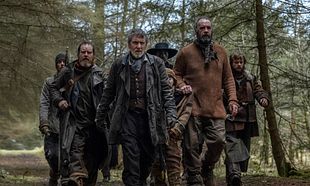In the summer of 1969, a series of free concerts took place in Morris Park in Harlem, New York. Though some 300,000 people attended the concerts that featured performances from the likes of Nina Simone, Stevie Wonder, Gladys Knight and the Pips, BB King, and Sly & The Family Stone, footage of the concert was not broadcast or shown until now...
Although we have now gone almost two years without live concerts and music festivals, it feels as though the concept had lost something long before this. When we look back on concert footage from years gone by, such as the Harlem Cultural Festival that features in 'Summer of Soul', the difference is magnified. The performances may sometimes be rough around the edges, but they're alive with passion. Even if the sound is a little bit ropey, and the footage is grainy, the power of talent and its vitality forces its way through. We see people fully taken in joy and song, completely charmed by it all. In watching 'Summer of Soul', you likely experience a tenth of that feeling, but it's still unforgettable. Perhaps the biggest thing you'll take away from 'Summer of Soul' is an overwhelming sense of regret that you never got to see that concert happening live.
Through a series of revealing interviews with performers at the festival, including Gladys Knight and Mavis Staples, as well as those who were there in the crowd, director Ahmir 'Questlove' Thompson charts the idea of a defining moment in Black consciousness in America. It ties together so many disparate elements - food, fashion, music, humour, media, political activism - to form a cohesive, comprehensive portrait of history and progress. Thompson's history as a DJ and musician means that he not only has an innate appreciation for the performances and gives them a time and a space to complete them, but also understands that they must sit together in a beat and a rhythm. No one musical acts get more time than any other, and the curation that Thompson brings to them is genius. The documentary opens with Stevie Wonder, thundering away on a drum solo as the stage of 1969 and the social upheaval is set. Later, the proto-funk stylings of Sly & The Family Stone sits neatly alongside an examination of how their music influenced fashion. After that, there's an interlude that explores dashikis and the Black Power movement of the '60s.
All of these elements slot neatly into the other, which forms a collage of sound, soul, colour, life, joy, rhythm, strife, love, and human connection that is almost breathtaking. The video footage is rendered in bright, vibrant colours and the music is as glorious and alive as when it was first performed before the audience all the way back in 1969. It's when Thompson brings in the interviews that you really begin to see how formative the Harlem Cultural Festival was for not only the performers, but for the Black community in the US, and New York itself. More than that, what makes it all so fascinating is that you've most likely never heard of this festival before. It's easy to see why, as the series of festivals occurred between Woodstock and the moon landing, which is treated with ambivalence by the festivalgoers in the documentary and by Thompson's own choice of footage that connects them together.
Even if soul music isn't in your own musical palette, there is still something undeniably appealing about 'Summer of Soul'. At the core, it is about the progress made by a people, what made them, what drove them, how it connects to the now and the then, what they loved, and even if it was hidden for half a century, it now sees the light of day at a time when it can do the most good.











































































